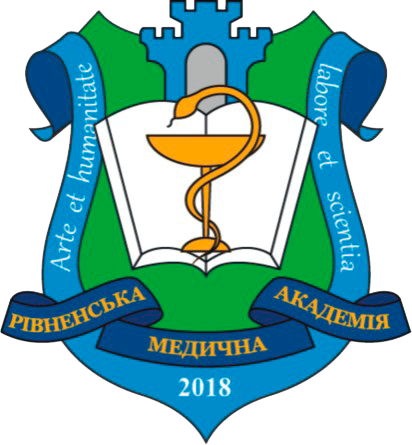INTEGRATION OF THE EDUCATIONAL COMPONENTS “LATIN LANGUAGE AND MEDICAL TERMINOLOGY” AND “ENGLISH FOR PROFESSIONAL PURPOSES” AS A TOOL FOR FORMING PROFESSIONAL-LINGUISTIC COMPETENCES OF MEDICAL STUDENTS
DOI:
https://doi.org/10.32782/health-2025.1.32Keywords:
Latin, English, medical terminology, medical education, integration of educational componentsAbstract
At the current stage of development of medical education in Ukraine, in the conditions of integration into the world educational and information space, its focus on international standards actualizes the problem of improving the quality of training of medical specialists. The high-quality training of a medical worker involves the use of an integrated approach to the formation of an integrated system of knowledge, abilities, skills and professionally significant qualities, which indicates the relevance of the integration of the educational components “Latin language and medical terminology” and “English for professional purposes” in the process of training medical students.The aim of the research is to reveal the essence of interdisciplinary integration and justify its necessity in teaching Latin and English in medical universities. Possession of international medical terminology and a foreign language at the communication level is an important factor in raising the general educational and professional levels of training of doctors and pharmacists. The main directions of implementation of interdisciplinary integration are the clear definition of its tasks and the search for optimal ways of implementation of interdisciplinary integration of Latin and English languages; revealing the integrative potential of the Latin language, using the latest teaching techniques; improving the content of education, creating an arsenal of possible forms and methods of education; use of comparative teaching methods, skills of recognizing cognate words; performing exercises on defining Latin-Greek word-forming elements (prefixes, suffixes), interpreting the etymology and semantics of Latin medical terms, as well as practicing the skills of correct spelling and pronunciation; directing the work of teachers to ensure interdepartmental interaction; quality update of educational and methodological materials, in which Latin and English become means of learning and getting information, as well as a tool for consolidating abilities and skills, expanding the scope of use of acquired knowledge.
References
Професійна педагогічна освіта: інноваційні технології та методики : монографія / за ред. О. А. Дубасенюк. Житомир : Видавництво ЖДУ ім. Івана Франка, 2009. 564 с.
Педагогіка вищої школи: словник-довідник / упор. О. О. Фунтікова. Запоріжжя : ГУ «ЗІДМУ», 2007. 404 с.
Гончаренко С. У., Козловська І. М. Теоретичні основи дидактичної інтеграції. Педагогіка і психологія. 1997. № 2. С. 9 –18.
Демінська Л. О. Міждисциплінарні зв’язки у процесі професійної підготовки майбутніх учителів фізичної культури : дис. … канд. пед. наук: 13.00.04. Донецьк, 2004. 245 c.
Бреус В. Є., Кувшинова І. І, Тірон О. І., Маркова О. О. Шляхи удосконалення викладання гістології, цитології та ембріології. Інтегративна антропологія. 2016. Том 27, № 1. С. 78–81.
Коняшина І. Формування професійної компетентності майбутніх фахівців фармацевтів у медичних коледжах. Інноваційні наукові дослідження у сфері педагогіки та соціальної роботи : збірник тез міжн. наук.-практ. конф., м. Сладковічево, 10–11 березня 2017 р. / за ред. проф. С. Мраз. Сладковічево, 2017. С. 128–130.
Колот А. М. Міждисциплінарний підхід як передумова розвитку економічної науки та освіти. Вісник КНУ імені Т. Шевченка. Серія: «Економіка». 2014. № 158. С. 18–22.
Козловська І. М., Литвин А. В. Інтеграція та наступність у розвитку змісту навчального знання: методологічний аспект. Неперервна професійна освіта: теорія і практика : збірник наукових праць / за ред. І. А. Зязюна та Н. Г. Ничкало. Київ : НТУ «ХПІ», 2001. Ч. 2. С. 177–183.
Дмитриченко М. Ф., Хорошун Б. І., Язвінська О. М., Глушенок Н. М. Міждисциплінарна інтеграція як один із ефективних засобів фундаменталізації вищої освіти. Фундаменталізація професійної підготовки у вимірі Європейського освітянського простору. Педагогіка і психологія, проблеми освіти : зб. наук. праць / за ред. М. Ф. Дмитриченко та ін. Київ : НТУ, 2010. C. 134–141.
Коваленко Н. П., Боброва Н. О., Ганчо О. В., Зачепило С. В. Мотивація студентів як запорука успішного професійного розвитку. Медична освіта. 2020. № 3. С. 43–48. DOI: 10.11603/me.2414-5998.2020.3.11440.
Bujalková М. The Coexistence of Latin and English in Medical Terminology and its Contribution to ESP Teaching. International Journal of Humanities Social Sciences and Education. 2018. Vol. 5, № 6. Р. 7–14.
Стегніцька Л. В. Розвиток і становлення англійської медичної термінології в аспекті мовної періодизації. Науковий вісник Міжнародного гуманітарного університету. Серія Філологія. 2019. Том 2, № 40. С. 81–85.
Terminologia anatomica: international anatomical terminology By the Federative Committee on Anatomical Terminology (FCAT). Stuttgart: Georg Thieme Verlag. 1998. 300 p.
Міжнародна анатомічна номенклатура / за ред. І. І. Бобрика, В. Г. Ковешнікова. Київ : Здоров’я, 2001. 328 с.
Українсько-англійський ілюстрований медичний словник Дорланда (переклад з 30-го американського видання): у 2 т. Львів : Наутілус, 2007. 2272 с.
Wallace M. J. Teaching Vocabulary. Oxford : Oxford University. Press, 1982. 144 p.





